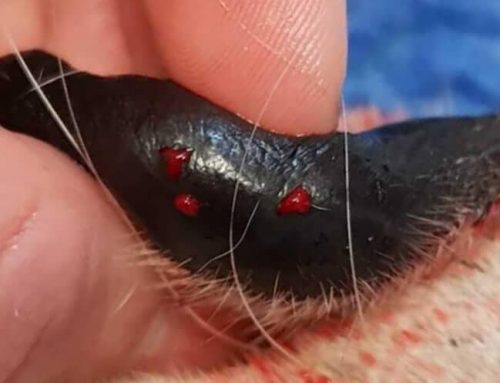Why Desex A Dog? Pros & Cons Of Spaying & Neutering
The decision to desex a dog can be a very difficult one for many owners.
There is a lot of confusing information on the internet with a lot of conflicting opinions, even amongst vets.
In this article, we will look at the bigger picture and discuss the pros and cons of desexing as to how it relates to health, behaviour and population dynamics due to unwanted pregnancies.
We hope that armed with this knowledge, you can make an informed decision about whether to keep your dog entire or not.

Common Definitions
Before we continue, some useful definitions for terminology used in this article:
Neoplasia: Cancer
Desexing: Removing the ovaries +/- uterus in a female dog & testicles in a male dog to prevent reproduction
Intact/Entire: An animal that has not been desexed and produces sex hormones
Spey/Spay: Desexing a female dog
Castration/Neutering: Desexing a male dog
Season: the heat cycle of a female entire bitch.
Note that the word neutering is often used to describe desexing both sexes.
What Are The Pros Of Desexing A Dog?
Reduce Unwanted Litters
Every year thousands of healthy dogs are euthanased in Australia and around the world.
The idea that we should give our children a chance to see puppies being born and rared is nice, but in reality, is not the best decision for our dogs.
There is also a commonly held misbelief that a bitch can only develop her personality if she produces a litter of pups.
Pups or no pups, your bitches personality will not differ.
Producing a litter of pups is extremely hard work and expensive.
Unless you are a registered, ethical breeder who is breeding to improve the breed, it isn’t a good idea.
Reduces Sex-Exacerbated Aggression Or Dominance
Some studies have shown that desexing can help reduce sex-exacerbated aggression in male dogs.
This aggression can make your pet more difficult to manage.
However, it must be noted that castration AFTER the behavioural problem has developed may not result in the resolution of the problem.
We can try to prevent this problem by neutering prior to any behavioural signs occurring.
For most dogs, this will be around 6 months of age but check out our article on the best age to desex your dog to find out what age to desex your particular breed.
Desexing can also reduce the risk of your dog being attacked by another dog.
Reduces Other Undesirable Behaviours
Behaviours such as inappropriate humping, roaming, territorial urine marking or barking and difficulties in training because of reduced human focus can be improved by desexing in some circumstances.
Behavioural issues can often result in a cascade of problems.
For example, the intact dog that regularly escapes searching for in heat females is at risk of being hit by a car and sustaining life-threatening injuries.
Reduces Council Registration Fees
Many local councils encourage surgical desexing and therefore provide substantial incentives by reducing registration fees.
Health Benefits
In female dogs, early desexing has been shown to be protective against mammary neoplasia (cancer).
Mammary cancer is high-risk cancer for female dogs and composes of around 50% of total canine neoplasia.
Female dogs that are desexed before their first heat (around 6 months of age) have a 0.05% risk of developing a mammary tumour later in life.
Between the first and second heat cycles the risk increases to 8%, and between the second and third heat, the risk of developing mammary cancer in her lifetime increases to 26%.
Intact female dogs aged 2 years and over, have a 7 times greater risk of developing mammary cancer when compared to dogs desexed at around 6 months.
What Are The Risks Of NOT Desexing Your Dog?
Messy High Maintenance Heat Cycles
In female dogs, the oestrus cycle can be messy.
A female on heat will bleed for several days and drop blood anywhere she walks and sits.
This will stain furniture, bedding and floorings.
You may have to invest in nappies for your dog.
Many bitches will show behaviour changes with the surge of hormones such as restlessness, humping/mounting behaviour, aggression, and excessive vocalisation.
It can be very difficult to control your bitch and other dogs when your bitch is in heat.
In fact, it is recommended that you don’t go out in public with a bitch who is in heat.
Adequately confining a bitch on heat can be extremely difficult.
Entire males can smell a bitch on heat from a long way off and will go to great lengths to get to them.
Your backyard or a kennel is not adequate protection against males!
Health-Related Issues
Surgical removal of the ovaries and uterus in a female reduces the risk of pyometra.
Pyometra is a life-threatening infection of the uterus.
Studies have shown that up to 25% of entire female dogs will develop a pyometra in their lifetime.
Treatment is often an emergency spay, usually after hours and when the bitch is extremely sick.
We can’t stress enough that this is life-threatening.
Pyometra is a potentially fatal condition and many dogs have died from this.
Many intact female dogs develop ‘false pregnancies’ about 40 odd days after a heat cycle.
While these false pregnancies aren’t an issue in themselves, the condition can predispose to the development of mastitis – an infection of the mammary glands.
Mastitis can be a serious and painful condition.
Pregnancy is risky.
While many dogs have no issues, when there are complications, these can be catastrophic and result in the loss of your bitch and the puppies.
Risks include:
- delivery problems that may require an emergency caesarian
- metabolic problems such as milk fever hypocalcaemia
- nutrition issues resulting in deformed puppies
- mastitis
In male dogs, desexing significantly reduces the risk of prostatic diseases such as an enlarged prostate, prostatic cysts and prostatitis.
It does not reduce the risk of prostate cancer, which is quite rare and holds a poor prognosis post-diagnosis.
In male dogs, desexing reduces the risk of testicular cancer.
Testicular cancer does have a reasonably high treatment success rate in most cases however castration is usually necessary.
One MYTH is that desexing will increase body weight.
While sex hormones can alter the deposition of fat, your dog’s body weight is something you have full control over via their food intake and exercise levels.
Please don’t use desexing as an excuse for a fat dog.





You made a good point when you said that it is extremely hard work and expensive to produce a litter of pups. With this in mind, my husband and I will surely consider having our dogs undergo the desexing process. As of the moment, we have 4 dogs, and we don’t think that we can still care for new ones not only due to financial reasons but also due to the fact that we will not be able to give them enough care and attention due to our busy work schedule. Thanks for sharing this.
It caught my attention when you pointed out that early desexing could help female dogs to be protected from mammary neoplasia which is high-risk cancer for female dogs. This is something that I will share with my brother so he could consider having his 1-year-old Labrador serviced by a professional. He said that he does not want his dog to end up dying due to diseases that could be prevented early on.
Hi Shammy,
Yes early spaying is protective against mammary cancer, however we do need to weigh the pros and cons against other potential diseases or conditions that may result from delaying spaying. Take a look at our article on Timing Of Desexing to see what is recommended for female labradors: https://www.yourvetonline.com/best-age-to-spay-or-neuter-a-dog/